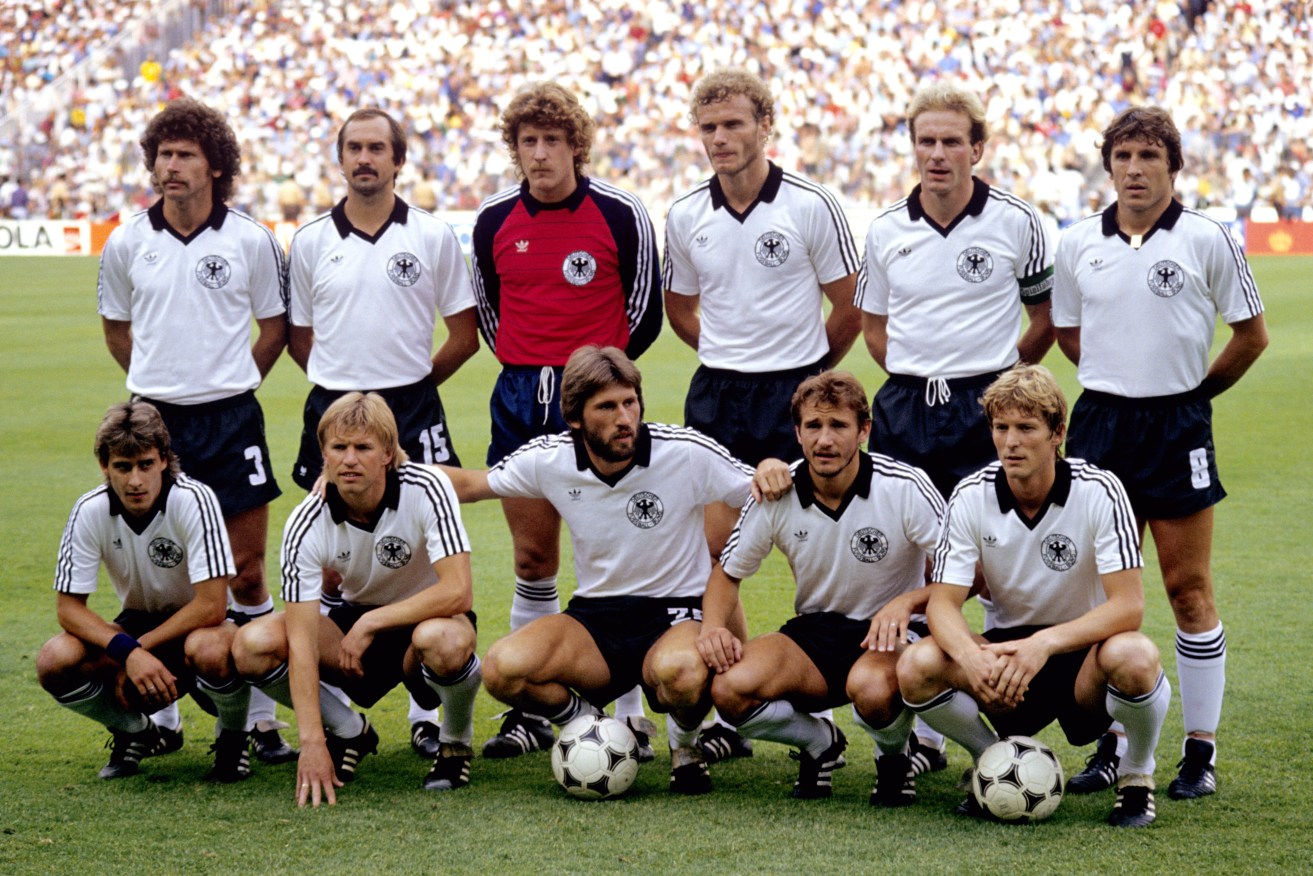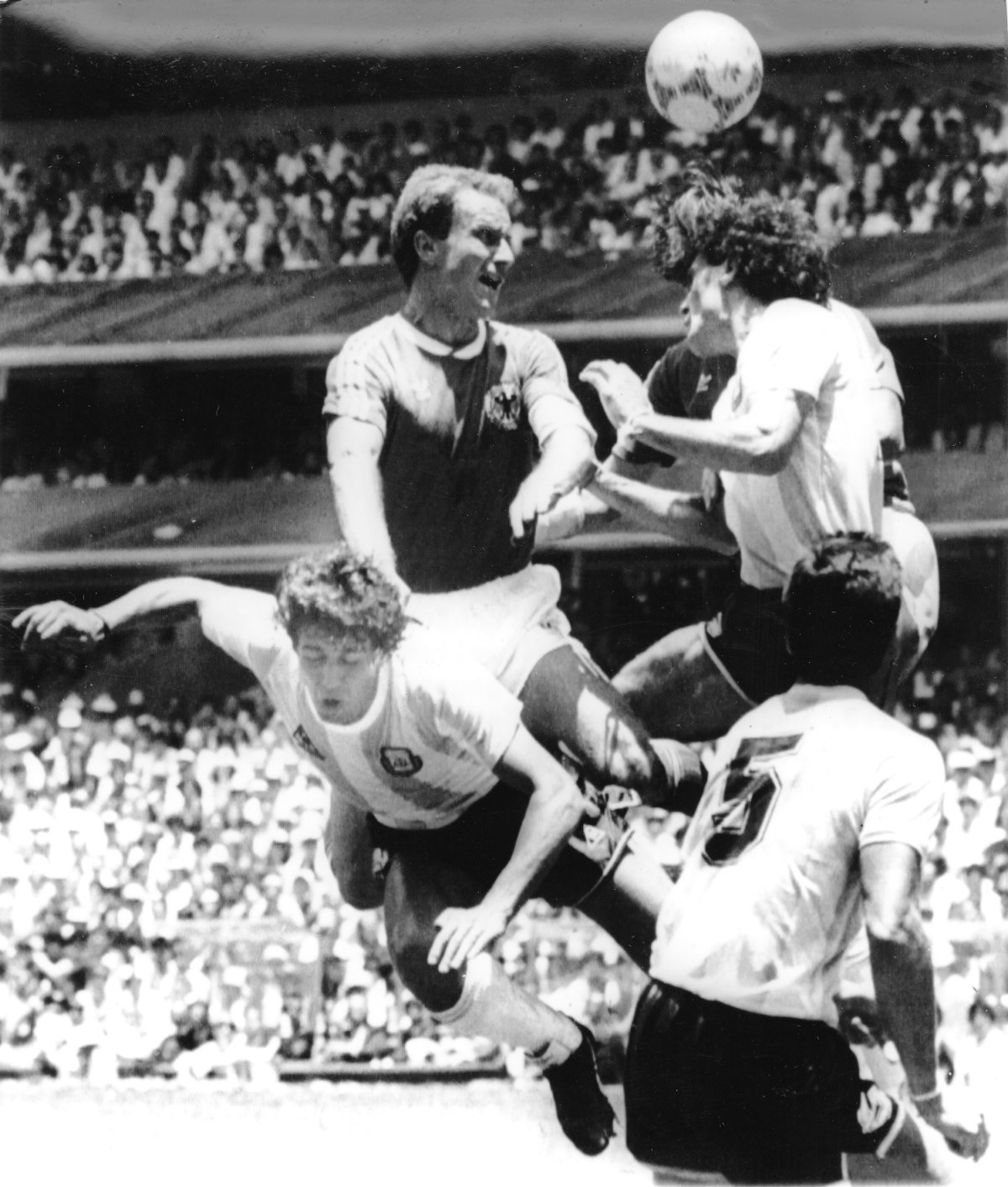Can the World Cup deliver the epic joys of the past?
With contemporary World Cup teams favouring more conservative play, InDaily’s Paul Marcuccitti, in Russia for the tournament, hopes for at least a few epic matches of the kind that once hooked a generation of young football fans.

The West German World Cup team of 1982 that went on to lose to Italy: (back row, l-r) Paul Breitner, Uli Stielike, Harald Schumacher, Hans-Peter Briegel, Karl-Heinz Rummenigge, Klaus Fischer; (front row, l-r) Pierre Littbarski, Bernd Forster, Manfred Kaltz, Wolfgang Dremmler, Karl-Heinz Forster. Photo: Peter Robinson/PA
It was, and remains, the greatest World Cup game ever played.
Had it not been, history may have been different. But because the match was so pulsating, it ensured that a then eight-year-old I know (who was watching) got hooked on the tournament.
Sure, that probably would have happened anyway, but if you needed an example of the kind of drama the World Cup could produce and how much it meant, the epic 1982 semi-final between West Germany and France delivered.
I had been following the tournament and seen other great games. But, at that age, I simply couldn’t watch everything (I’m pretty sure we didn’t have a VCR at the time either) and I don’t recall being awake for one of the other famous matches from that edition – the second round clash between Italy and Brazil.
Ah but that match between the French and the Germans. Even watching it now, or highlights of it, still gives me goosebumps.
There were so many things I didn’t know at the time which, on discovering after the match was played, simply added to the legend. Such as Franco-German history, something I doubt I need to detail.
I also didn’t know that the Germans went into the World Cup as European champions but managed to make themselves the ’82 tournament’s bad guys.
That’s because, after a shock loss to Algeria, West Germany needed to beat Austria in its final group game to reach the second round. The Austrians were in a better position to progress but, if they lost by three or more goals, they would be eliminated.
So, after the Germans took an early 1-0 lead, both sides were content to more-or-less walk around the pitch, making no real effort. You can probably imagine the outrage that caused.
Even though there’s plenty of World Cup fever now, I feel the tournament desperately needs matches like the West Germany v France classic.
It was clearly a hot night in Seville for the West Germany v France semi, but neither side would be able to make short work of the match. It would go the distance. And then some.
A fine strike by Pierre Littbarski (yes, who would later coach Sydney FC) gave the Germans the lead in the first half but France quickly levelled through a penalty scored by Michel Platini (yes, that guy).
Then one of most controversial moments in World Cup history occurred early in the second half. France’s Patrick Battiston, who had just entered play from the substitutes’ bench, collected a through ball to be one-on-one with onrushing West German ‘keeper Harald Schumacher. Battiston got to the ball and put it wide of the goal; Schumacher, however, collided with the Frenchman.
Battiston was knocked unconscious and also lost two teeth – not that long ago, he said the incident still haunted him. Incredibly, the foul wasn’t punished by Dutch referee Charles Corver. At the time he was one of the game’s top officials; later he would say that he missed the incident because he was following the path of the ball.
Both teams had chances to find a winner before the 90 minutes were up. But there was more to come. Much more.
Extra time would give us goals and, in keeping with a classic match, they were all sublime.
The French took a 3-1 lead in the first period of extra time. A glorious volley by Marius Trésor put them ahead and then a tremendous shot from Alain Giresse looked to have won the match.
But West Germany had an ace up its sleeve and its name was Karl-Heinz Rummenigge.

West Germany’s Karl-Heinz Rummenigge (dark-jersey) fights for the ball against three Argentinian players during the 1986 World Cup final. AP photo
One of the great players of the day, Rummenigge had been omitted from the starting lineup through injury, however, he came off the bench to try to rescue his team.
And how. Before half-time of extra time, a skilful and instinctive finish by the Germans’ talisman brought the score back to 3-2. Then, 12 minutes from the end, Klaus Fischer equalised with a bicycle kick.
So to a tie-breaking method that had never before been used at the World Cup finals: penalty kicks.
Ah, the shootout. It brought the villain, Harald Schumacher, back to centre stage.
The French were looking good, however, when German defender Uli Stielike (who also looked like a bad guy) saw his attempt saved. Didier Six then could have given France a near-unassailable 4-2 lead. But his shot was blocked by Schumacher.
Stielike didn’t see this. He was still being consoled by teammates who then told him that Six’s miss meant they were back in business. Perhaps a voice inside the central defender’s head told him that he’d be the last German to fail from the spot in a shootout in a major international tournament for 34 years. (He was, of course, in Australia in 2015 as coach of the South Korean team which reached the final of the Asian Cup.)
After 120 unforgettable minutes of play and five penalties each, there was still no separating the two nations. Now to sudden death; a penalty each until one team scores and one misses.
Then, in a flash, it was over. French defender Maxime Bossis saw his shot saved by Schumacher, and forward Horst Hrubesch proceeded to win the shootout for West Germany.
By the time the 1986 tournament rolled around, I was ready. I had a newspaper liftout handy and even made my own chart on which I could record results and update tables on. When it comes to soccer, deep down, I’m still that kid.
All that may have happened anyway, but the memory of the excitement of 1982 certainly played a part in building the anticipation for the next edition.
Even though there’s plenty of World Cup fever now, I feel the tournament desperately needs matches like the West Germany v France classic.
A lot has changed since then. Freer player movement and the changed format of the UEFA Champions League (which gave it more matches and more revenue) have created European super clubs. And the rise of the Champions League means the World Cup is no longer the undisputed pinnacle of the game.
Moreover, these days you don’t see many games at the World Cup in which a team overcomes a two-goal deficit, particularly at the business end of the tournament. You have to go back to 1994 for the last time a two-goal lead was cancelled out in the knockout phase (Brazil v Netherlands).
That doesn’t mean there haven’t been other great games – there have. But the top teams tend to advance to the end of the tournament using cautious tactics in low-scoring games (blessedly, one knockout match in 2014 didn’t stick to the script: Germany’s remarkable 7-1 win over Brazil).
Meanwhile, the Champions League keeps delivering high-scoring epics, recently highlighted by a semi-final tie between Liverpool and Roma which produced 13 goals over two matches.
Late last year, British sports journalist Jonathan Wilson addressed this topic with a piece called “World Cup might not be the greatest show on earth”.
He wrote that the (UEFA) Champions League and the Premier League were better than international football “because club managers get to work with their players day in day out, a luxury denied their international counterparts”.
Then, despite acknowledging that he was “predisposed to liking international football”, Wilson nailed why we see few goals and less attacking play at World Cups:
“The vast majority of managers with a couple of weeks to work with their players before a tournament will focus on defending. Nobody wants to be on the end of a memorable hammering, like the 8-0 one Saudi Arabia suffered at the hands of Germany in 2002. It’s a particular issue given all but five or six teams next summer aren’t that good. A narrow defeat or a penalty shoot-out exit is explicable in a way that going down 4- or 5-0 is not. Players, similarly, are desperate to avoid being the man remembered forever for a costly error. Caution and conservatism will reign.”
Wilson’s solution is “a smaller, more concentrated (World Cup) finals tournament”.
I don’t agree. It won’t change the main limitation that international coaches have – the inability to work with their players daily in the months and years leading up to the finals.
In 2022, the World Cup tournament will be played in November/December, moving it away from its traditional time slot in the middle of the year. That might affect its buildup as it will interrupt the top European competitions. Then the expanded 2026 tournament (which will feature 48 teams) will give us a format that might prove unpopular and encourage more conservative play.
At the same time, the power of the top European clubs is only likely to increase.
A few roller coaster games over the next few weeks might not be a panacea, but if there are kids out there experiencing the tournament for the first time, it’d be nice if what it delivers gets them hooked too.
Paul Marcuccitti is InDaily’s soccer columnist. During the A-League season, he writes Manton Street Tales – a regular column about the fortunes of Adelaide United.




